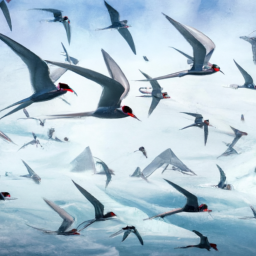Bird migration has long captivated scientists and nature enthusiasts alike, presenting a complex tapestry of behavior that intertwines instinct, environmental cues, and evolutionary adaptations. Understanding the processes underlying this phenomenon has been a subject of inquiry for centuries, and recent efforts have shed light on the intricate mechanisms that guide birds during their seasonal journeys. In my experience observing avian behavior, it is clear that migration is not merely a response to changing seasons but a sophisticated interplay of biological and ecological factors. Birds undertake these arduous journeys, often spanning thousands of miles, to find optimal breeding and feeding grounds. The motivations behind these migrations are deeply rooted in survival, with species adapting their behaviors to ensure their continued existence. Research indicates that various species of birds migrate at different times and for different reasons. For instance, some species, like the Arctic Tern, migrate from the Arctic to the Antarctic, covering a staggering distance of approximately 44,000 miles annually. Studies show that these migrations are driven by the availability of food resources and suitable nesting sites, which are often dictated by seasonal changes in climate. Experts agree that the processes underlying bird migration are influenced by a combination of genetic predisposition and environmental stimuli. For example, many birds rely on celestial navigation, using the position of the sun and stars to guide their paths. Additionally, they are sensitive to changes in the Earths magnetic field, which helps them maintain their bearings over long distances. Research confirms that these navigational skills are honed through both instinct and learned behavior, as younger birds often accompany older, more experienced individuals on their first migrations. The study of bird migration has evolved significantly over the years, with advancements in technology allowing researchers to gather more precise data. Satellite tracking and geolocators have revolutionized our understanding of migratory patterns, enabling scientists to monitor the movements of individual birds in real-time. According to official reports from various ornithological societies, this data has revealed previously unknown migratory routes and stopover sites, highlighting the importance of conserving these critical habitats. Despite these advancements, several paradoxes remain in our understanding of bird migration. For instance, while some species exhibit remarkable fidelity to migratory routes, others display a more flexible approach, adapting their paths based on environmental conditions. This variability raises questions about the evolutionary advantages of such behaviors and how they may change in response to climate change. As observed in recent studies, climate change poses a significant threat to migratory birds. Shifts in temperature and weather patterns can disrupt the timing of migrations, leading to mismatches between the availability of food resources and the arrival of migratory species. Research shows that some birds are already adjusting their migration schedules, departing earlier or later than they historically have. This adaptability may provide short-term benefits, but the long-term implications for species survival remain uncertain. The conservation of migratory birds is a pressing concern, as many species face habitat loss due to urbanization, agriculture, and climate change. Regulatory agencies report that protecting key migratory stopover sites is essential for the survival of these species. Initiatives aimed at preserving wetlands, forests, and other critical habitats are crucial for maintaining the ecological balance that supports migratory birds. In my experience, the collaborative efforts between scientists, conservationists, and policymakers are vital in addressing these challenges. By sharing knowledge and resources, stakeholders can develop more effective strategies to protect migratory birds and their habitats. For instance, the establishment of migratory bird reserves and the implementation of sustainable land-use practices can help mitigate the impacts of human activities on these vulnerable populations. Looking ahead, the future of bird migration research holds great promise. As technology continues to advance, we can expect even more detailed insights into the behaviors and needs of migratory birds. The integration of genetic studies with ecological data may provide a more comprehensive understanding of how these species adapt to changing environments. Furthermore, interdisciplinary approaches that combine ornithology, ecology, and climate science will be essential in developing effective conservation strategies. In conclusion, the early efforts to understand the processes underlying bird migration have laid a solid foundation for ongoing research and conservation initiatives. While significant progress has been made, many questions remain unanswered. As we continue to explore the complexities of avian migration, it is imperative to prioritize the protection of migratory birds and their habitats. The survival of these remarkable species depends on our ability to adapt our understanding and actions in response to the challenges they face. By fostering a deeper appreciation for the intricacies of bird migration, we can ensure that future generations will continue to marvel at the wonders of the natural world.
TRENDING NOW
WORLD
Global Messaging Trends: Can Local Apps Like Arattai Overtake Giants?
44% 🔥
POLITICS
Accusations fly over whether Republicans or Democrats 'own' shutdown
35% 🔥
POLITICS
Rep. Mike Haridopolos, R-Fla., talks about the government shutdown
34% 🔥
POLITICS
What happens now that the government has shut down. And, a pricing deal with Pfi...
26% 🔥
POLITICS
Married, but no connection: Reality of silent divorces in Indian homes
31% 🔥
POLITICS
Netanyahu's apology to Qatar, phone on Trump's lap: A telling White House photo
38% 🔥
MOST READ
SPORTS
Week 5 NFL odds, lines, betting picks, spreads: 2025 predictions: Model backs Sa...
55% 🔥
SPORTS
Predicting every undefeated college football team's first loss: Will anyone beat...
36% 🔥
SPORTS
Tigers Lefty Tarik Skubal Deserves Second Straight AL Cy Young Award
54% 🔥
SPORTS
Jets Get Official Braelon Allen Injury Diagnosis
61% 🔥
SPORTS
Gill: India won't be 'looking for any easy options' against West Indies
49% 🔥
SPORTS
Phil Mickelson takes a jibe at golf during friendly banter with ex-LIV Golf CEO’...
39% 🔥

